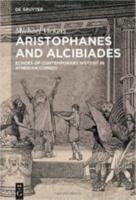
De Gruyter (2015) h/b 241pp £59.99 (ISBN 9783110437539)
Readers familiar with V.’s earlier writings will already know his basic thesis: Greek drama is intensely political and the surviving plays of Aristophanes, no matter what their apparent plotlines, are satires on Pericles’ household, and in particular on Alcibiades. For, as Libanius remarked, ‘What play did not include [Alcibiades] among its cast of characters?’ V. circumvents the objection that Aristophanes rarely mentions Alcibiades by name by invoking emphasis, ‘covert allusion’, defined by Quintilian as ‘the process of digging out some lurking meaning from something said’. To help uncover this lurking meaning, V. employs the ‘wigwam argument’, whereby ‘each pole would fall down by itself, but together the poles stand up, by leaning on each other’.
After briefly summarizing his thoughts on the six earliest extant comedies (the subject of his Pericles on Stage), V. focuses on Plutus, Lysistrata, Thesmophoriazusae, Frogs and Ecclesiazusae (with additional chapters on Euripides’ Ion, Helen and Andromeda), erecting his wigwam by drawing on a wealth of literary and epigraphic material, including later anecdotes which, even if unreliable historically, are (he writes elsewhere) ‘the expressions of quintessential truths, distilled over centuries’. In addition, he maintains that Greek playwrights employed both ‘portmanteau characterization’, ‘whereby a single dramatic figure might embody features of different well-known historical individuals’ (Socrates in Clouds is an amalgam of philosophers in Pericles’ circle) and ‘polymorphic characterization’, whereby ‘different facets of an individual’s personality or public image could be played by a different character on stage’.
Arguing that Alcibiades and his role in the Peloponnesian War dominated Athenian drama in the last years of the fifth century bc, V. finds many clues to track him down in a diversity of characters. A few examples must suffice here. One is Alcibiades’ well-known lambdacism. Although this is seldom indicated in the text (according to Quintilian, ‘errors in speech and of the tongue’ could not be written down), V. undertakes an exhaustive survey of instances where he believes that the substitution of lambda for rho both makes for a better joke and helps solve textual problems, reasoning that the actor (wearing an Alcibiades mask) was expected to mimic Alcibiades’ voice and adopt his trademark ‘funny walk’. For V. there are other textual pointers, too. The words bia (force) and bios (life) invariably point to Alcibiades; compounds of timē (honour) to the Spartan queen Timandra (supposedly seduced by Alcibiades); kleinos (famous) to Alcibiades as the son of Cleinias; and so on. Similar techniques are used to identify other figures such as Pericles, Aspasia and Alcibiades’ wife Hipparete.
Abandoning his preferred metaphor, V. at one stage compares his technique to a pointillist painting, whose dots mean little individually but build cumulatively to become a picture. But patterns can also be seen in stars, real only in the eye of the beholder. While the basic poles of V.’s thesis conspire to form a plausible structure, much else seems impossibly contrived, and his wigwam is constantly in danger of being subsumed under the weight of the tenuous, tendentious and speculative. Although undoubtedly ground-breaking and thought-provoking, and while offering useful new perspectives and interpretations, this is a book to be handled with care, and certainly not by those in the early stages of Aristophanic studies.
David Stuttard
